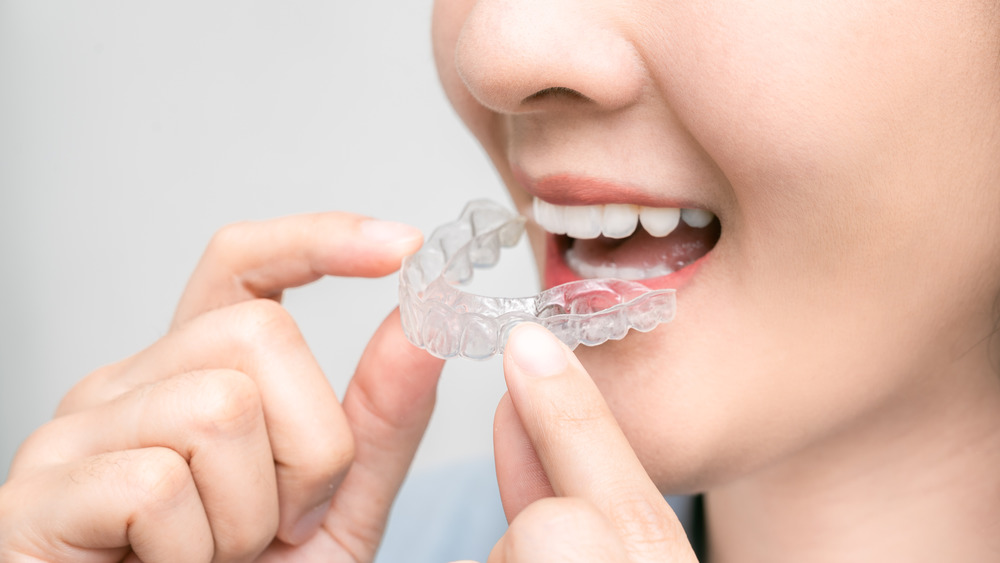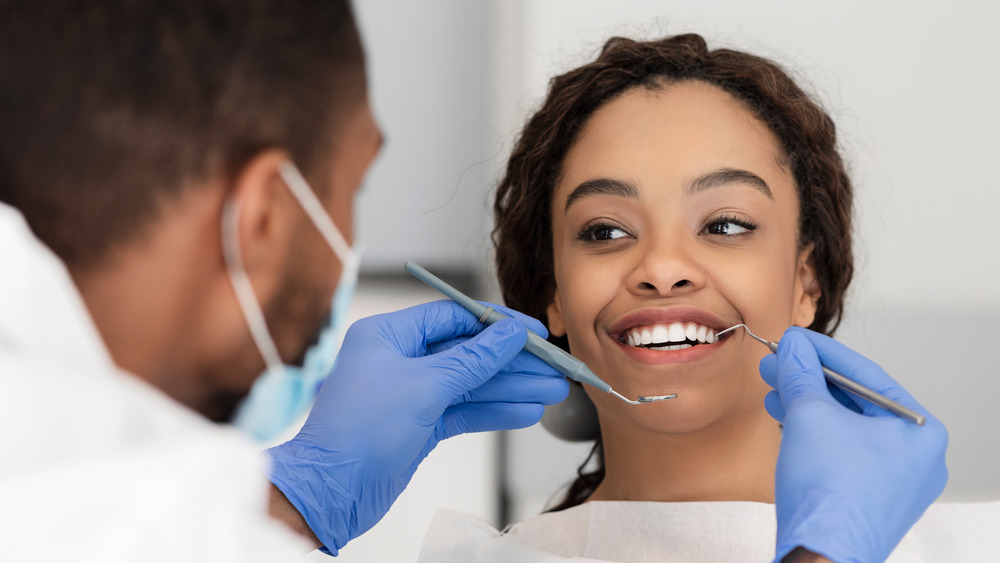Expert Reveals The DIY Dentist Tricks You Should Never Try At Home
It's not news that dental work and orthodontics can be prohibitively expensive for people who aren't fortunate enough to have comprehensive dental insurance or a flourishing bank account. For this reason, folks sometimes attempt to remedy dental issues with at-home remedies and procedures, but without the supervision and instruction of a professional, these treatments can go awry and may not only fail to fix the problem at hand, but could also make it worse or create new, more dangerous issues.
We spoke with Whitney DiFoggio, registered dental hygienist and the host/creator of YouTube channel "Teeth Talk with Whitney" about the most common dental treatments folks attempt to take care of at home, and why they are often a bad idea. "DIY dental work is never a good idea and is dangerous to your health," DiFoggio says. "Here are the four most common DIY dental trends on social media that need to stop."
DIY dental hacks to avoid
The first social media at-home dental trend DiFoggio wants to go the way of the dodo is DIY tooth straightening. "Teeth aligners are only recommended under the care of your dental provider," she says. "Attempting at-home teeth aligners yourself runs the risk of damaging your tooth roots, which can cause root resorption and tooth mobility, which can ultimately lead to tooth loss." We imagine you'd rather have crooked teeth than loose or missing ones! For this reason, stick with aligners provided by or at least approved by your dentist or orthodontist. Seeking this treatment "entails a consultation with your dental provider, who will then order the aligners and monitor your teeth through the entirety of the aligning process. It is extremely important for your dental provider to have recent dental x-rays and records of your mouth to confirm they can safely move your teeth without damaging your roots," says DiFoggio.
Another trend DiFoggio calls "terrifying" is filing one's teeth down with nail files. "The main reasons people have been shaving down their teeth are because they think their canines look too pointy and because they want all of their teeth the same height," she tells us. "Simply said — never do this," she warns us. "Once your enamel is shaved down — it will never grow back." If you want the shape of your teeth changed, speak to your dentist, because if you do it yourself, "you can expose the nerve of your tooth which is painful and expensive to fix." Ouch!
More DIY dental fixes to steer clear of
You also shouldn't use hydrogen peroxide as a mouthwash habitually. While, according to DiFoggio, there "are some cases where patients can swish with hydrogen peroxide safely for different gum and mouth tissue situations ... it is not recommended routinely." This is because not only does it kill off bad bacteria, but it also kills the good bacteria. For this reason, you don't really want to use peroxide for whitening every day, either. "There are trends on social media where people are swishing for 30 minutes straight, making it even more detrimental to the tissue in your mouth. Just because hydrogen peroxide is the 'ingredient' in most whitening strips... it is not the same. Whitening strips are applied to your teeth — not to your gums, tongue, and all of the surrounding tissues in your mouth!" said DiFoggio.
Another thing people try to create themselves are tooth replacements or dentures made from moldable plastic beads. "The risk of attempting to fabricate your own dentures and caps (a.k.a. crowns) significantly outweigh any expected benefits. Not only is putting non-medical grade foreign objects into your mouth unhygienic — it can also be detrimental to your teeth, gums, and surrounding tissues in your mouth," says DiFoggio. You could create an infection, you could damage teeth or gums, and you could worsen whatever issue you are trying to fix. In short, always discuss with your doctor any issue you have, even if you have to work out a longterm payment plan; it's safer than DIY!


